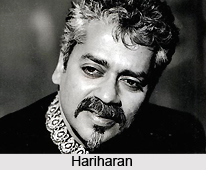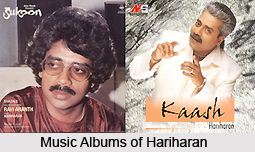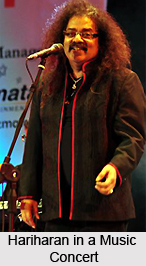 Hariharan is a well renowned Indian playback singer in Hindi, Telugu, Tamil, Kannada, Malayalam, Bhojpuri and Marathi movies, and also a recognised Ghazal singer, and one of the forerunners of Indian fusion music. Hariharan`s melody is hugely appreciated by critics and audiences as well. In 2004, he was bestowed with the Padma Shri by the Government of India. The musical scene of India has been stormed in the year 1996 with the phenomenal success of his music album Colonial Cousins. This music album was launched by Hariharan along with Leslie Lewis. It was an Indian-English fusion album that captured the number one position of the Indian musical charts in that year. This album had also earned Hariharan adequate international recognition.
Hariharan is a well renowned Indian playback singer in Hindi, Telugu, Tamil, Kannada, Malayalam, Bhojpuri and Marathi movies, and also a recognised Ghazal singer, and one of the forerunners of Indian fusion music. Hariharan`s melody is hugely appreciated by critics and audiences as well. In 2004, he was bestowed with the Padma Shri by the Government of India. The musical scene of India has been stormed in the year 1996 with the phenomenal success of his music album Colonial Cousins. This music album was launched by Hariharan along with Leslie Lewis. It was an Indian-English fusion album that captured the number one position of the Indian musical charts in that year. This album had also earned Hariharan adequate international recognition.
Early Life of Hariharan
Hariharan was born on 3rd April in the year 1955, at Puthan Theruvu or Thiruvananthapuram, Indian state of Kerala. But he was raised in Mumbai (formerly known as Bombay). Hariharan obtained his educational degree of Bachelors in science and law. He was born to renowned Carnatic vocalists, Shrimati Alamelu and the late H.A.S. Mani, also known as Anantha Subramani Iyer. Hariharan has received his introductory training from Shrimati Alamelu who was his mentor. Under her expert tutelage he has learnt the nuances of Carnatic music.
From a very young age, Hariharan has also received training in Hindustani music. But later on, he was moved by the Mehdi Hassan and Jagjit Singh and developed a passion for it. Afterwards he received training in Hindustani music from Ustad Ghulam Mustafa Khan. Hariharan decided to pursue his career in Ghazal singing. He sharpened his skills by learning Urdu.
 Playback Career of Hariharan
Playback Career of Hariharan
In the year 1977, Hariharan bagged the honour of achieving the top prize at the All-India Sur Singaar competition. And after that competition the late music director Jaidev signed him for playback for the Hindi movie Gaman. Ajeeb Saane He Mujh Par Qarar was his debut song. This song became a huge hit and for that Hariharan was awarded an Uttar Pradesh state award. He was also nominated for the Best Singer National Award. His career as a playback singer geared up then after.
At the beginning of his career, Hariharan has performed in many concerts as well as performed on TV programmes. He has also lent his voice for a number of TV serials like Junoon. In the year 1992, with the emergence of debutant music director A R Rahman, Hariharan made his entry to the world of Tamil films. The patriotic song Thamizha Thamizha of Maniratnam`s film Roja was a super hit. In the year 1995, Hariharan was honoured as the best male playback singer by the Tamil Nadu State Government Film Awards. This award has been given to him for his outstanding rendition of song Uyire Uyire also by music director A R Rahman in Mani Ratnam`s Bombay. For the soulful rendition of the song Mere Dushman Mere Bhai, from the Hindi movie Border, composed by Anu Malik, Hariharan was conferred the National Award for the Best Playback Singer.
Some of the films, where Hariharan has collaborated with Rahman includes Muthu, Minsara Kanavu, Indian, Jeans, Taal, Mudhalvan, Kannathil Muthamittal, Rangeela, Indira, Anbe Aaruyire, Iruvar, Sivaji, Kangalal Kaithu Sei, Alaipayuthey, Guru, Enthiran etc. Hariharan has also acted in a Tamil film with actress Khushboo. The movie was titled Power of Women and he also played a cameo role in the Tamil film Boys.
Indi-Pop Career of Hariharan
The fusion album Colonial Cousins with Mumbai-based composer cum singer Leslie Lewis in the year 1996 was a milestone for Hariharan`s career. The album fetched the string of awards including that MTV Indian Viewers` Choice award. As a result, Hariharan was established as one of the pioneers of Indian fusion music. The following albums by Colonial Cousins, The Way We Do It in 1998 and Aatma in 2001 were moderately noticed. Colonial Cousins had also composed soundtrack in the 2009 Tamil film Modhi Vilayadu.
Ghazals of Hariharan
Hariharan has also released many Ghazal albums to his credit and of which most of the Ghazals are written by himself. Abshaar-e-Ghazal, with Asha Bhosle, was the first Ghazal album by Hariharan. Gulfam was another hit album by Hariharan. In sales, this album hit double platinum. It also earned the Diva Award for Hariharan and became the Best Album of the Year in the year 1994.
 Some major Ghazal albums by him are, Shamakhana; Mausam; Sukoon in the year 1983; Aab Shaar-e-Ghazal in the year 1985; Reflections in the year 1987; Dil Nasheen in the year 1988; Dil Ki Baath in the year 1989; The Very best of Hariharan ghazals (compilation album) in the year 1989; Hariharan in concert in the year 1990; My Favourite Hits in the year 1990; Hazir in the year 1992; Gulfam in the year 1994; Paigam in the year 1995; Qaraar in the year 1995; Saptarishi in the year 1995; Visaal in the year 1996; Jashn in the year 1996; Aathwan Sur-The Other Side of Naushad in the year 1998; Kaash in the year 2000; Lahore Ke Rang, Hari Ke Sang in the year 2006; Waqt Par Bolna in the year 2007.
Some major Ghazal albums by him are, Shamakhana; Mausam; Sukoon in the year 1983; Aab Shaar-e-Ghazal in the year 1985; Reflections in the year 1987; Dil Nasheen in the year 1988; Dil Ki Baath in the year 1989; The Very best of Hariharan ghazals (compilation album) in the year 1989; Hariharan in concert in the year 1990; My Favourite Hits in the year 1990; Hazir in the year 1992; Gulfam in the year 1994; Paigam in the year 1995; Qaraar in the year 1995; Saptarishi in the year 1995; Visaal in the year 1996; Jashn in the year 1996; Aathwan Sur-The Other Side of Naushad in the year 1998; Kaash in the year 2000; Lahore Ke Rang, Hari Ke Sang in the year 2006; Waqt Par Bolna in the year 2007.
Collaborations of Hariharan
For a track called Bolo Bolo Hariharan also collaborated with Pakistan based band Strings. With Punjabi bhangra artiste Daler Mehndi, Hariharan has released an album called Destiny. Latest Ghazal album by him, Lahore ke rang, Hari ke sang along with celebrated Ghazal composers from Pakistan. This album of his inside and outside India won him rave reviews and critical acclaim. Urdu Blues a terminology that is coined by him with his vastly successful album Kaash. His album Kaash featured musicians like Anandan Sivamani, the percussion maestro, Ustaad Rashid Mustafa on tabla, Ustad Liyaqat Ali Khan on Sitar and Ustad Sultan Khan on Sarangi. On his Ghazal album Haazir, Hariharan also collaborated with Tabla maestro Ustad Zakir Hussain.
Awards of Hariharan
For his outstanding contribution in music Hariharan was conferred the prestigious Padma Shri and Swaralaya-Kairali-Yesudas Award in the year 2004. His other awards include National Film Awards in 1998 and 2009, Tamil Nadu State Film Awards in 1995 and 2004, Kerala State Film Awards in 2011, Asianet Film Awards in 2011, Nandi Awards in 1999 and Filmfare Awards South in 2011.






